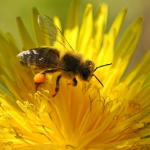Bees are pollinators but they risk global extinction due to pesticides and other factors, which would have serious implications for food production and ecosystem health.
In Summary
- In recent years, bees have been mysteriously dying off from “colony collapse disorder.”
- It has been blamed partly on pesticides as well as mites, viruses, and fungi.
- The United Nations has warned that 40 percent of the planet’s insect pollinators, particularly bees and butterflies, risk global extinction.
- This would have serious implications for food production and ecosystem health.
A new study that allowed humans to spy on bumblebees inside their nests showed that pesticides can impair social behaviour, making it hard for bees to eat and rear their young, researchers said Thursday.
Previous research has shown that the common class of pesticides known as neonicotinoids can harm bees’ ability to forage outside the nest.
The latest findings add to long-standing concerns about these important pollinators’ health, which could affect food production.
Researchers tracked the changes in bees’ behaviour by placing cameras inside 12 specially made boxes that contained one chamber for a nest and another chamber for foraging.
Some bees were exposed to concentrations of the neonicotinoid imidacloprid similar to that expected in the environment. Others were not.
They found the pesticide-exposed bees were less social in a variety of ways than control bees placed in similar boxes but not fed nectar that contained neonicotinoids.
Read more ……click on full article link.
Credit: Daily Nation
Full article: https://www.nation.co.ke/lifestyle/health/Pesticides-harming-bees/1954202-4843802-92336t/index.html

